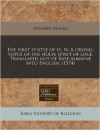3
Followers
24
Following
Cogitatio
Reflections on philosophy, theology and just observations on life.
Currently reading
The first epistle of H. N. A crying-voyce of the holye spirit of loue. Translated out of Base-almayne into English. (1574)
The Works of James Arminius, Volume 1
Politics, Law, and Morality: Essays by V.S. Soloviev
Meditations on the Soul: Selected Letters
The Complete Poetry and Prose
The Encyclopedia of Philosophy (8 Volumes in 4)
Cambridge Platonist Spirituality
Wellsprings of Faith: The Imitation of Christ; The Dark Night of the Soul; The Interior Castle
Paul and the Stoics
Locke: Two Treatises of Government (Cambridge Texts in the History of Political Thought)
Stephen bar Sudaili, the Syrian mystic, and the book of Hierotheos
 Interesting book on this little known Syrian mystic who seems to have had some connection to the author of the Dionysian corpus. His theology seems to be a mixture of Neo-Platonism and Origenism, but may owe something to earlier strains of Syrian gnosticism. It is fairly clear why he was considered a heretic. His pantheistic views are plain and his universal salvationist ideology is certainly more ridiculous than the patristic writers that came before him who supported the same doctrine. Subsequent Christian mystics did echo some similar concepts -usually without the pantheism of course.
Interesting book on this little known Syrian mystic who seems to have had some connection to the author of the Dionysian corpus. His theology seems to be a mixture of Neo-Platonism and Origenism, but may owe something to earlier strains of Syrian gnosticism. It is fairly clear why he was considered a heretic. His pantheistic views are plain and his universal salvationist ideology is certainly more ridiculous than the patristic writers that came before him who supported the same doctrine. Subsequent Christian mystics did echo some similar concepts -usually without the pantheism of course. Some of the ideas are interesting if one can successfully displace them from the pantheistic context and find a new application. They do seem to resemble ideas present in scripture, albeit twisted beyond almost all recognition. I wanted to read this simply because I collect various types of Christian works -including even heretical ones. The relationship that Bar Sudaili has with orthodox (e.g. Isaac of Nineveh and Pseudo-Dionysius) and semi-orthodox/semi-gnostic (e.g. Tatian and Bardesan) Syrian writers is an intriguing question. I don't subscribe to pantheism at all, but I can see some things here that would have appealed to more orthodox mystical theologians. Ironically, I am reading a work by Ruusbroec and he echoes very similar ideas (maybe not surprisingly he was accused of heresy by Jean Gerson and for very similar things).
The whole book of Hierotheos is not here translated unfortunately. It is more of an abridgement and summary. Still, there is enough here to learn what Bar Sudaili taught. Hierotheos appears to have been a creative fiction -which is not at all unheard of in mystical tradition. There has been pantheistic tendencies within Christian mystical literature for quite some time. In many cases the more acceptable form of panentheism has been the norm. Orthodox (meaning traditional) Christianity has rightly taken a negative position on both however.













